This is a variation on the obligatory ‘How I Got Published’ post. Just like every honeymooner in Thailand must recount the two weeks in tedious detail to seemingly interested friends actually entertaining murderous thoughts, it is absolutely necessary for the Debut Author to explain in blog form, at some point before Book One comes out, how they went from manuscript to agent to publisher. In my case, this post is long overdue, so here it is.
But I thought I’d take this opportunity to offer a little comparison of the publishing systems in France and in the UK, since I’ve been published in France for three years, and that the two systems are interestingly different. I don’t claim that my experience is entirely representative (but whose is?), so take this with a pinch of salt (or with a pair of pincers, as the French would have it).
FRANCE: Alone in the jungle
In France, I started sending stuff to publishers when I was nine years old, because I was already joyously self-confident and deluded. I got dozens of adorable rejection letters. You get really nice rejection letters when you’re a kid; it’s when you turn 14 or so that the standard rejection letters start coming in. Anyway, I continued sending story after story after story for eleven years.
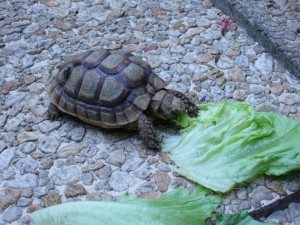
Eleven years during which our pet tortoise Georges-Alain grew from matchbox-sized to clog-sized.
Then something funny happened. When I was 20 I was interning for a French publisher over the summer, and I was beginning to know their list by heart. So I thought I’d tailor one or two little stories to their editorial line. I wrote two, sent them to the publisher under a pseudonym, and was therefore there when they opened them, discussed them, and accepted them. It all happened in the office, in front of me.
It’s only when they started going, ‘Oh, it would have been good to have her phone number, she hasn’t written it anywhere’ (I’d made up a pseudonymous hotmail account, though!) that I said, ‘Well, guess what! you can talk to her LIVE!’ and it was all very theatrical and amusing. That’s how my first two books got published, and then the third one was published with the same publisher as well but a year later.
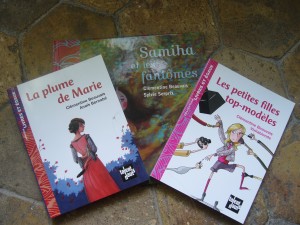 My first three: Samiha et les fantômes, Les petites filles top-modèles, La plume de Marie
My first three: Samiha et les fantômes, Les petites filles top-modèles, La plume de Marie
But see, in France the issue is that there aren’t any literary agents, at least not for unpublished writers. It’s not the way it works. Authors have to fend for themselves. They have to send manuscripts to publishers (they all accept unsollicited manuscripts, of course), and they have to negotiate their own contracts. This makes them much more vulnerable than in the UK.
Authors in France are rarely tied to a specific publishing house; many publish lots of different books with lots of different publishers, sometimes at the same time, because they have to make money and that, well, being published in France isn’t exactly the most comfortable position financially. Ok, I’ll be honest, it sucks. You’re paid very little, unless you’re remarkably famous, or remarkably good at negotiating. Volume is thus key if you want to make a living out of writing – or you can do lots of school visits, which are well-paid.
Since I don’t want to make a living out of my writing and don’t write very much in French (1 to 2 books a year, which is nothing compared to my French writerly friends), this isn’t my main preoccupation. Personally, my biggest problem is that in France, even when you’re already well-published, you can rarely guarantee that what you’re working on now will ever get published. You have to go through the whole process every time: writing a full manuscript, editing it thoroughly, sending it to publishers.
Of course, you might want to send it in priority to people who’ve already published you, as you have their personal email addresses and it might get read more quickly – but most of the time they’ll just be like, ‘No’. Rarely do editors say to you, ‘Let me read the first three chapters and I’ll tell you if it’s worth keeping writing’. Even more rarely will they give you a contract and a deadline just on the basis of that. So it’s extremely precarious (and discouraging). You pile up manuscripts that never find a publisher.
 And when, conversely, you’re in the happy/ terrifying situation when more than one publisher wants your book, as happened with my latest YA novel La pouilleuse, well, you have to make a decision on your own. It’s tough, because you have very little actual knowledge of what the different publishers may do to your book.
And when, conversely, you’re in the happy/ terrifying situation when more than one publisher wants your book, as happened with my latest YA novel La pouilleuse, well, you have to make a decision on your own. It’s tough, because you have very little actual knowledge of what the different publishers may do to your book.
So you weigh prestige against edginess, enthusiasm against advance money, and finally you make a completely uninformed, rushed decision. Not that I’m unhappy with my chosen publisher, mind you – I’m hopefully about to publish another 2 books with them next year. But in no way can I claim that my choice was either rational or business-like.
As a result an author’s relationship to publishers is always ambiguous, and a bit unhealthy. These are people you’re wrestled with, battled with. You’ve asked them for more money, for more author copies, for more consideration. They’ve rejected your stuff, sometimes harshly. They might reject what you’re writing now. They’re also more prone to things like emotional blackmail, voluntarily or not. You’re very dependent on them. It’s not a comfortable position for people like me, who aren’t particularly good at separating professional and private discussions and who’d rather not get paid at all than have to talk about money – especially when you feel like you’re begging for an extra 50€.
UK: On the passenger’s seat
In the UK, getting published is a completely different story. Of course there are ways to bypass agents and submit directly to publishers, but for me, that was a huge no-no. I knew, from my experience in France, that I didn’t have the guts or the patience or the knowledge to deal directly with publishers. So when I finished my first novel in English in 2010, I immediately looked for an agent.
It was a YA novel called Hominidae, and the day I sent the first 3 chapters and synopsis to Kirsty McLachlan at David Godwin Associates (I’d only sent it to 3 agencies, I think), she asked me for the full manuscript. A few days later I talked to her on the phone; we discussed ways of modifying it, I did the editing, we met up in London and she offered representation. It was extremely painless and fast.
Not like the year that followed. Because Hominidae never got sold. That was heartbreaking. When you get an agent you think you’ve done the hardest bit, and that now it’s going to sell – but when you get letter after letter after letter from publishers saying that ‘although they loved this and that, the full thing didn’t work for this or that reason’, that’s pretty awful. Especially as you keep thinking, gosh, my lovely agent’s going to drop me. She didn’t, thankfully.
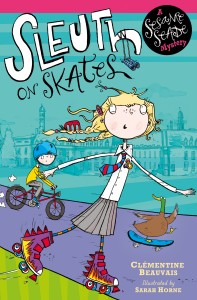 In the summer of 2011 I had another idea and wrote the first Sesame book, which at the time was called Sesame Seade Is Not A Swan and is now called Sleuth on Skates. Kirsty liked it, and dropped Hominidae (which wasn’t going anywhere) and started shopping Sesame. And then, interestingly, the same thing happened with Sesame that had happened with La pouilleuse: namely 3 publishers wanted it. And it was fascinating to see how differently it went.
In the summer of 2011 I had another idea and wrote the first Sesame book, which at the time was called Sesame Seade Is Not A Swan and is now called Sleuth on Skates. Kirsty liked it, and dropped Hominidae (which wasn’t going anywhere) and started shopping Sesame. And then, interestingly, the same thing happened with Sesame that had happened with La pouilleuse: namely 3 publishers wanted it. And it was fascinating to see how differently it went.
Firstly, in France I had about two hours to make a decision, and had to make phone calls to French publishers on my own. I had virtually no useful information to decide and no one to consult. Here, Kirsty set up the process of decision and auction for Sesame to last over several days. I went down to London and we visited all three publishers together. They gave me sesame seed chocolates and sesame snaps. We talked for over an hour every time about potential illustrators, further books in the series, modifications to the manuscript, etc. They were selling themselves too – that’s what struck me the most. They were telling me what they would be bringing to the book concretely, not just saying that they liked it.
 Then they made their offers and the amazing, cool-headed Kirsty dealt with all that, which meant I didn’t even have to utter the words ‘advance money’ or ‘royalties’. Although it was still eminently stressful, it was a hundred times better than being alone in making that decision. I was on the passenger’s seat: I gave my opinion and expressed preferences but Kirsty was the one who was doing all the hard work.
Then they made their offers and the amazing, cool-headed Kirsty dealt with all that, which meant I didn’t even have to utter the words ‘advance money’ or ‘royalties’. Although it was still eminently stressful, it was a hundred times better than being alone in making that decision. I was on the passenger’s seat: I gave my opinion and expressed preferences but Kirsty was the one who was doing all the hard work.
I know that this account might make some UK authors cringe. They’ll say that even though we have agents, we have to be proactive and shrewd and take charge, that I’ve fallen into a trap and am just being lulled into a false sense of security. I agree, of course, to an extent – but believe me, when you’ve been through the jungle of the French system, you appreciate the comfort, albeit illusory.
This comfort extends to relationships with editors, too – I can talk to them and be friendly with them and plan things, knowing that whenever we start talking about money and the details of a contract Kirsty will be there. I don’t have to worry that I’ll be short-changed. The author-editor relationship, as a result, is über-professional, less tainted with ambiguous friendliness-eneminess.
Well well well, as usual I have written a blog post the size of my PhD thesis (which I’m almost done with, by the way!). I hope it’s a little bit instructive even by just reading the sentences in bold. Oh dear, I haven’t even shown what I wanted to show, i.e. pictures of my author copies of Sleuth on Skates which have just arrived in my pigeon hole!
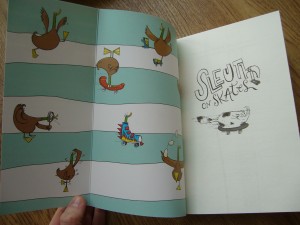
There are flaps with ducks doing manic things, courtesy of Sarah Horne

There’s a map of Christ’s College, in which Sesame lives for parent-related reasons…
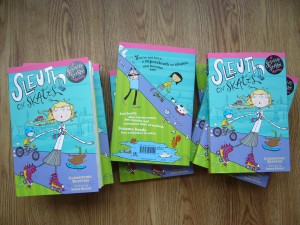 And here’s the pile!
And here’s the pile!
Coming out May 2nd. Fun, busy times. Crazy crazy busy. But I promise you, random reader, that I’ll try to update this blog more regularly. You might not care; but then maybe you do.
Clem x












